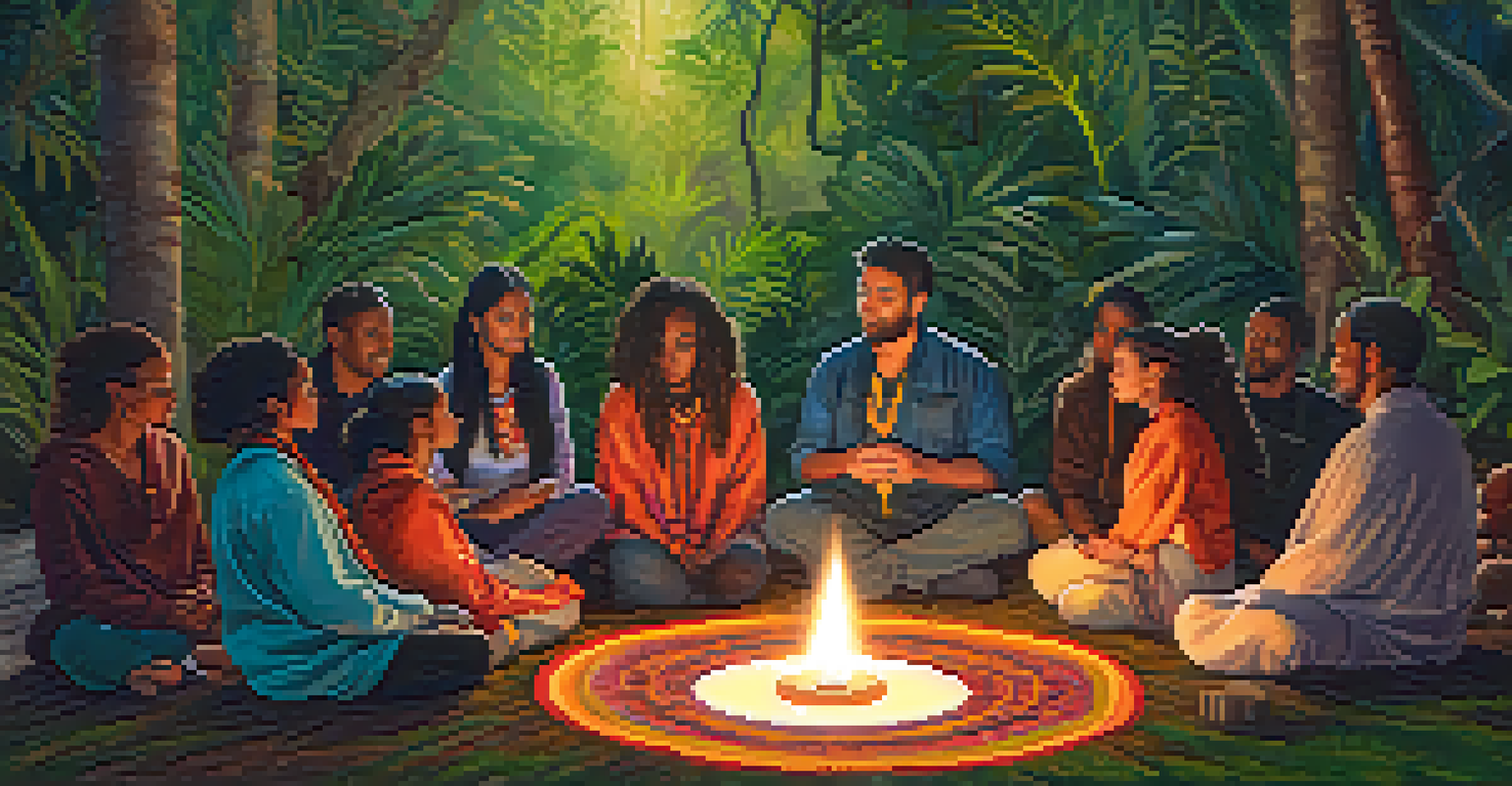Ayahuasca Tourism: Cultural Exploitation or Genuine Experience?

What is Ayahuasca and Why is it Popular?
Ayahuasca is a traditional Amazonian brew made from the Banisteriopsis caapi vine and other plants. It's often used in spiritual ceremonies for its psychoactive effects, which many believe lead to deep insights and healing experiences. As interest in alternative wellness practices grows, more people are drawn to ayahuasca retreats, particularly in countries like Peru and Brazil.
The journey of a thousand miles begins with one step.
The allure of ayahuasca lies in its promise of transformative experiences, often described as life-changing. However, this surge in popularity raises questions about the authenticity of these experiences and the motivations behind them. Are seekers truly looking for connection and healing, or is it merely an exotic adventure?
Understanding ayahuasca's cultural roots is crucial. For Indigenous communities, these ceremonies are sacred, steeped in tradition and spirituality. As outsiders flock to these experiences, it's essential to consider the implications for those who have practiced these rituals for generations.
The Rise of Ayahuasca Tourism
Ayahuasca tourism has exploded in recent years, with countless retreats popping up across the Amazon. This boom is often driven by a blend of fascination with psychedelics and a desire for personal growth. Travelers seeking enlightenment and healing have turned to these retreats, creating a lucrative industry.

While this influx of tourists can provide economic benefits to local communities, it also raises concerns. Many retreats are run by individuals who may not have the necessary cultural understanding or respect for the traditions involved. This can lead to a dilution of the authentic experience, as the focus shifts from spiritual healing to profit.
Understanding Ayahuasca's Roots
Ayahuasca is a sacred brew with deep cultural significance for Indigenous communities, and its popularity raises ethical concerns about cultural exploitation.
Moreover, the commercialization of ayahuasca can lead to practices that are unregulated and potentially harmful. Without proper guidance and understanding of the brew's effects, participants may find themselves unprepared for the intensity of the experience, which can have lasting psychological effects.
Cultural Exploitation vs. Authentic Experience
The debate around ayahuasca tourism often centers on cultural exploitation versus genuine experience. On one hand, some argue that these retreats commodify sacred practices, stripping them of their meaning. This commodification can lead to an experience that is more about the thrill than the spiritual journey.
We do not inherit the Earth from our ancestors; we borrow it from our children.
On the other hand, proponents of ayahuasca tourism suggest that sharing these traditions with outsiders can foster greater understanding and respect for Indigenous cultures. They argue that when done respectfully, these experiences can enhance cultural exchange and bring attention to the preservation of these ancient practices.
Ultimately, the line between exploitation and genuine experience is thin. It requires careful consideration of how these practices are presented and who benefits from them, ensuring that the voices of Indigenous peoples are prioritized and respected.
Navigating the Ethics of Ayahuasca Retreats
Travelers interested in ayahuasca retreats should approach their choices with ethical considerations in mind. Researching the background of the retreat center is essential; understanding who leads the ceremonies and their qualifications can impact both the experience and the local community. Ethically run retreats prioritize cultural education and respect for traditions.
Moreover, transparency about the impact of tourism on local communities is crucial. Travelers should be aware of how their presence affects the environment and the people who call these areas home. Engaging with retreat centers that give back to the community can help ensure that tourism is sustainable and beneficial.
Ethics of Ayahuasca Tourism
Travelers should approach ayahuasca retreats with an awareness of ethical considerations, prioritizing respect for Indigenous traditions and the impact on local communities.
Lastly, potential participants should reflect on their intentions. Are they seeking genuine healing, or are they looking for a thrill? Understanding personal motivations can lead to a more fulfilling and respectful experience.
The Role of Indigenous Communities
Indigenous communities are at the heart of the ayahuasca tradition, and their voices must be heard in the conversation around tourism. Many communities seek to protect their cultural heritage from the pressures of commercialization while still sharing their traditions. This delicate balance can be challenging to maintain.
Some Indigenous practitioners have begun to offer their own retreats, aiming to create authentic experiences that honor their cultural practices. By directly involving Indigenous people in the tourism process, there’s potential for positive outcomes that benefit both visitors and local communities.
It's important for tourists to engage with these communities respectfully, acknowledging their wisdom and contributions. By doing so, travelers can help foster an environment where Indigenous knowledge is valued, ultimately enriching their own experience.
Personal Experiences: What to Expect
For those considering an ayahuasca retreat, it's helpful to know what to expect. Participants often describe the experience as intense, with emotional and psychological challenges emerging during sessions. Many report feelings of catharsis and profound insight, while others may face difficult memories or emotions.
Preparation is key to navigating this journey successfully. Many retreats offer guidance on mental and physical preparation, emphasizing the importance of a clear mindset and openness to the experience. Engaging in self-reflection prior to the retreat can enhance the overall journey and help participants process their experiences afterward.
Future of Responsible Tourism
The future of ayahuasca tourism hinges on collaboration between tourists, retreat centers, and Indigenous communities to ensure respectful and sustainable practices.
Sharing these experiences with others can also provide support and context. Many participants find value in discussing their journeys with fellow attendees, creating a sense of community and understanding as they navigate the complexities of their ayahuasca experience.
The Future of Ayahuasca Tourism
As ayahuasca tourism continues to grow, the future holds both promise and challenges. There’s potential for a greater emphasis on ethical practices and respect for Indigenous traditions. By fostering a deeper understanding of the cultural significance of ayahuasca, tourism can evolve into a more respectful and enriching experience for all involved.
The integration of sustainable practices within the tourism industry is also crucial. As travelers become more conscious of their environmental impact, there’s an opportunity to support initiatives that preserve the Amazonian ecosystem and promote responsible tourism.

Ultimately, the future of ayahuasca tourism will depend on collaboration between tourists, retreat centers, and Indigenous communities. By prioritizing respect, understanding, and sustainability, all parties can create a more harmonious relationship that honors the traditions of ayahuasca while providing meaningful experiences for visitors.